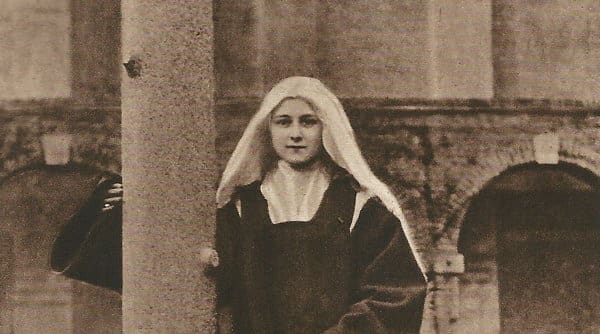If there was ever a Saint who needed no introduction, it may be the one who opens October – St. Thérèse of Lisieux.
Born in France in 1873, the fifth surviving daughter of St. Louis and Zélie Martin, she lived a simple, happy childhood marred by the death of her mother when she was only four years old. Thérèse remained surrounded by the intimacy and devotion of her tight family circle until she entered the Carmelite convent in Lisieux as a girl of 15. There, she would live a hidden life until her death at the age of 24, when her autobiography would suddenly reveal her to the world, and we would rapidly fall in love with her and with her secret: spiritual childhood. Within 28 years of her death, she would become a saint and then later – astonishingly – a Doctor of the Church.
One of her most famous images, and one of my favorites, is the living garden of the Lord.
St. Thérèse opens her autobiography, The Story of a Soul, awash in wonder at the mercies of God, in incredulous praise of the Lord who chooses the smallest souls to be Saints and lifts them up from the floor of the forest to the garden of His heart.
“I saw,” she writes, that every flower He has created has a beauty of its own, that the splendor of the rose and the lily’s whiteness do not deprive the violet of its scent nor make less ravishing the daisy’s charm. I saw that if every flower wanted to be a rose, Nature would lose her spring adornments, and the fields would be no longer enameled with their varied flowers.
“So it is in the world of souls, the living garden of the Lord. It pleases Him to create great Saints, who may be compared with the lilies or the rose; but He has also created little ones, who must be content to be daisies or violets, nestling at His feet to delight His eyes when He should choose to look at them. The happier to be as He wills, the more perfect they are.”
She sees herself as the now-famous “Little Flower” with nothing to recommend herself to God except complete surrender to Him in her own smallness. That is, humility. And that, perhaps, is the most charming adornment a soul can put on before her Lord. It is the irresistible virtue which draws Him to the soul.

I have always loved the Little Flower, whose simple beauty has spread like a meadow of wildflowers and changed the landscape of our spirituality, whose fragrance has sweetened my own devotion like the cream in my coffee. Simple, rich, always right.
I used to think, though, that she really wasn’t so small – modest, maybe, but actually the richest rose in the garden and the brightest and biggest bloom. That she sort of thought herself small and insignificant, but was really extraordinarily gifted from the start.
I’ve since come to see that to think in such a way is to take away from her own wisdom and to downplay the very goodness of God that she lives to praise. She would recoil at any attempt to take away her littleness. She wrote to her sister Marie, “What pleases (God) is that He sees me loving my littleness and my poverty, the blind hope that I have in His mercy…This is my only treasure…Oh dear Sister, I beg you, understand your little girl, understand that to love Jesus, to be His victim of love, the weaker one is…the more suited one is for the workings of this consuming and transforming love.”
The greatest thing about Thérèse was simple but profound: her enormous desire to love Jesus with everything she had and her radical receptivity to His love for her, to the point of offering herself as a victim of Merciful Love. She allowed herself to crumble before him, and He carved out caverns in her heart, in its hidden humility, where He could unleash His love and power in torrents. Still, the true weight of her secret would stay within her until her Story of a Soul was published to carry her mission forward. The teaching of spiritual childhood would change our prayer forever.
It was the encounter of absolute smallness with the massive mercy of God that made the miracle who is Thérèse.
And to say that she was anything other than small is to say that there is less hope for the rest of us.
Because, truthfully, every day brings new, glaring reminders of my own inadequacy and incompetence. I know I am a constant temptation to frustration for those around me as I clumsily navigate marriage, motherhood, work, and life – forgetful, distracted, thoughtless in a thousand ways every day. Fumbling prayer, dropping grace – my human failings are inescapable reminders that I was not born to be a rose or a lily. Anything anyone could see as good in me is a gift of grace, freely given.
And yet, because God has designed us to need each other, while I may not have the lovely, natural grace of the rose or the striking poise of the lily, I do have something the world needs, and something God delights in. It is part of my life’s journey to find that something and give it freely – first to God, to magnify in His generosity, and to use as He wills for His glory and for the building of His kingdom. Given just as freely as the Little Flower is with sending us roses from heaven.
Freedom is found then in not striving to be what we are not, but in becoming more of what we are: “The happier to be as He wills, the more perfect they are.”
“Humble yourselves therefore under the mighty hand of God, that in due time He may exalt you.” (1Peter 5:4)
“For the sake of Christ, then, I am content with weaknesses, insults, hardships, persecutions, and calamities, for when I am weak, then I am strong.” (2 Cor 12:10)
Editor’s note: A version of this post also appeared in Endow Voices.
Photo credit, violets: Nikita Singhal via Unsplash





